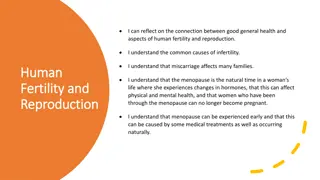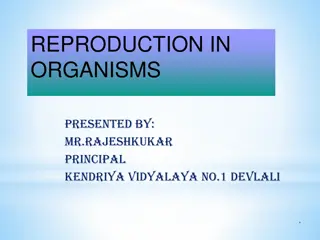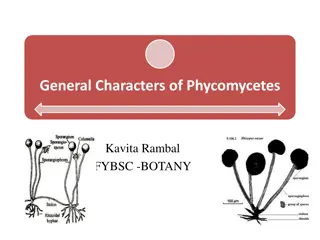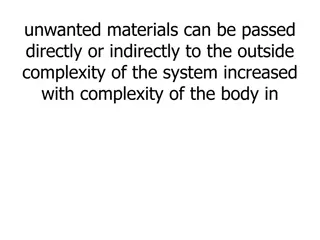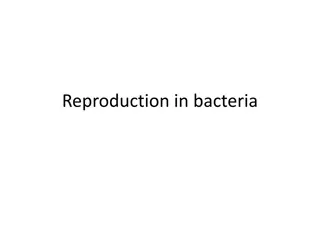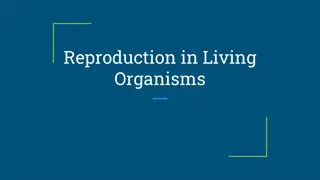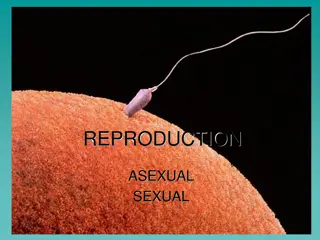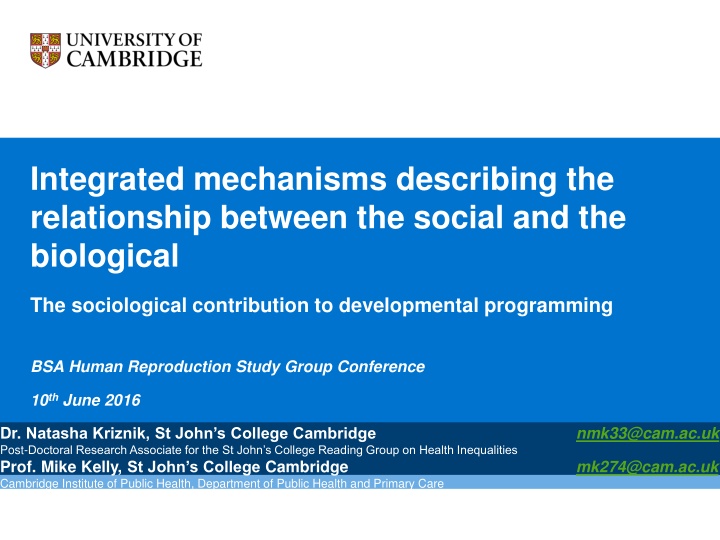
Sociological Contribution to Developmental Programming in Health
Discover the link between social and biological influences on health development, exploring the impact of wider social environments on biological outcomes, particularly during the periconceptional period. Explore existing literature and key concepts in understanding the sociological aspects of developmental programming.
Download Presentation

Please find below an Image/Link to download the presentation.
The content on the website is provided AS IS for your information and personal use only. It may not be sold, licensed, or shared on other websites without obtaining consent from the author. If you encounter any issues during the download, it is possible that the publisher has removed the file from their server.
You are allowed to download the files provided on this website for personal or commercial use, subject to the condition that they are used lawfully. All files are the property of their respective owners.
The content on the website is provided AS IS for your information and personal use only. It may not be sold, licensed, or shared on other websites without obtaining consent from the author.
E N D
Presentation Transcript
Integrated mechanisms describing the relationship between the social and the biological The sociological contribution to developmental programming BSA Human Reproduction Study Group Conference 10th June 2016 nmk33@cam.ac.uk Dr. Natasha Kriznik, St John s College Cambridge Post-Doctoral Research Associate for the St John s College Reading Group on Health Inequalities Prof. Mike Kelly, St John s College Cambridge Cambridge Institute of Public Health, Department of Public Health and Primary Care mk274@cam.ac.uk
Outline Developmental programming Missing sociological contribution Existing literature on social causes of disease Research project Key sociological concepts Links to the lifecourse Thinking about periconceptional diets using social practice theory The sociological contribution to developmental programming
Developmental programming Biological process where environmental factors influence gene expression during in utero growth and beyond Elevated stress hormones Poor maternal nutrition Particularly important for periconceptional period: 14 weeks before conception to 10 weeks after conception How early life events, both in the womb and after birth, influence future (adult) health and well-being
Wheres the sociological contribution? Developmental programming concerned with influence of wider environment and its impact on biological development The foetus's environment is the mother; the mother s environment is the social Norms and expectations Everyday practices Socio-economic situation Food and drink Pollution Living conditions Environment/biosphere Working conditions
Wheres the sociological contribution? Sociology is aware of the impact of social context on health - but fewer clear attempts to substantially link with biological explanations Historical tensions Fears of reductionism Some moves towards suggesting the need for further integration (e.g. Meloni) but not really mainstream thinking Yet pregnancy, early years and childhood development are key areas in public health policy and research
Existing literature on social causes of disease The social as a precondition for disease Social Susser and Susser (1990) Chinese boxes Biological Thisted (2003) Direct effect on health and disease Cockerham (2007) social factors can initiate pathology Link and Phelan (1995) social factors as a direct cause of illness Kelly et al. (2014)
Existing literature on social causes of disease Population factors Rose (2008) population strategy The causes of causes Marmot and Wilkinson (2005) multiple influences across the lifecourse A web of causation Krieger (1994) ecosocial perspective Kelly et al. (2014)
Research project Interdisciplinary group: sociologists, philosophers, medics, psychologists, historians Disease causation Health Inequalities Developmental programming Interested in the interface between the social and biological systems H E A L T H Social Biological Identified sociological concepts that could help negotiate this boundary
Key sociological concepts The lifeworld Schutz Sociology and phenomenology Structuration theory Giddens Sociology and politics Social practice theories Number of theorists: Bourdieu, Giddens, Foucault, Marx
The lifeworld What is the lifeworld? How can this contribute to DP? A way of conceptualising how individuals think about, or model, the world in order to make sense of it Interface between biological and the social Lifeworld of mother and lifeworld of foetus are critical Lived experiences provide us with a view of the world and gives a sense of place and self-worth Uterus as a biological location of social processes Also how individuals understand others views of the world intersubjectivity We all inhabit different lifeworlds and these are shaped by our interactions with others, and their lifeworlds
Structuration theory What is structuration? How can this contribute to DP? Structures are consequences of individual actions, but also act on individuals and shape action Recursive (repetitive) nature Historical understanding of practices Dynamic relationship you cannot see this if you focus on either structure or agency Exposure to stressors in an interactive way There is no grand plan for society Action Structure
Social practice theory What is social practice theory? How can this contribute to DP? Practices are made up of: Practices rather than choices are central avoids individual behavioural focus and blaming individual Cultural expectations and meanings Adapted from Shove et al (2012) Practices shaped by surrounding environment (physical and social) Recruitment Materials and resources Requisite knowledge Intersectionality of practices how certain practices are linked (e.g. healthy breakfast, food shopping, preparing food)
Lifecourse Lifeworld Structuration Social practice theories
Thinking about periconceptional diets (and health) using social practice theory Diet and lifestyles of women of child-bearing age also partners! Awareness of lifecourse experiences which shape lifeworld and expectations Not just about providing people with information/education and expecting them to make better choices Cultural expectations and meanings Need to consider practice-based responses Requisite knowledge Materials and resources Moving away from blaming women
The sociological contribution: social practices How people view the world, interact with it, the practices they undertake: these are recursive and become routine, habitual and clearly have a biological impact All social practices affect health in some way, either positively or negatively Not just about individual behaviour or choices how actions (e.g. healthy breakfast) are influenced by wider cultural expectations and meanings, being able to obtain the resources to undertake certain actions, having the knowledge to participate in practices Promoting integrated thinking practices as a way for social theory to engage more directly with biological processes
References Cockerham W C (2005) Health Lifestyle Theory and the Convergence of Agency and Structure. Journal of Health and Social Behaviour 46(1): 51- 67. Kelly M P, Kelly R S and Russo F (2014) The Integration of Social, Behavioral, and Biological Mechanisms in Models of Pathogenesis. Perspectives in Biology and Medicine 57(3): 308-328. Shove E, Pantzar M and Watson M (2012) The dynamics of social practice: everyday life and how it changes. Sage Publications;
Thank you for listening! Acknowledgements: St John s College Annual Fund Prof. Ann Louise Kinmonth Prof. Mike Kelly Contact: Email: nmk33@cam.ac.uk Twitter: @NMKriznik


